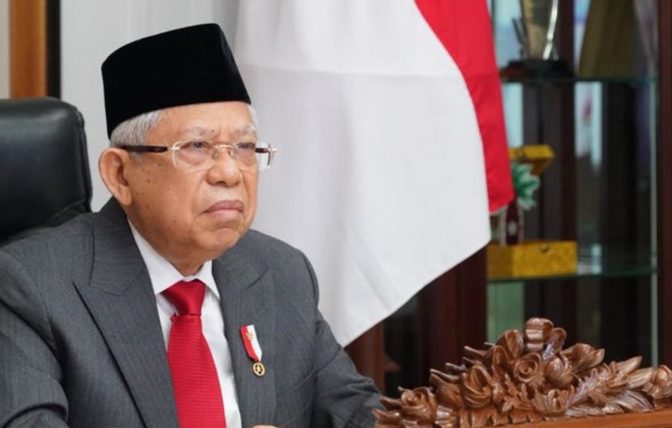
 "
"

 "
"

Indonesia has ambitious plans to make its Islamic economy sector much bigger as it has started making regional banks and other financial institutions shariah-compliant. The reason. They want to increase their Islamic financial assets significantly to become a leader in the global Islamic economy. To do so, Vice President Ma’ruf Ami has instructed the National Committee for Islamic Economy and Finance (KNEKS) to take the necessary steps.
Indonesia, the world’s most populous Muslim-majority nation, is focusing on developing its halal industry to meet domestic and global demand in light of trends that indicate sharia businesses grew amid the economic crises wrought by the pandemic.
The halal industry has been able to record positive performance despite the pressure on economies around the world owing to the COVID-19 pandemic. Before the pandemic, in 2019, the industry had recorded a growth of 3.2 percent — higher than the global economic growth of 2.3 percent.
Indonesia is the world’s biggest market for halal products, particularly in the food, tourism, pharmaceuticals, and cosmetics sectors, she pointed out.
“This potential must inspire business operators to work on the halal industry,” she said.
Indonesia’s sharia economy is focusing on developing the halal industry, sharia finance, sharia social finance, and sharia entrepreneurship.
The government’s support has been apparent from the several policies aimed at developing the halal industry, including the establishment of a Special Economic Zone (KEK) for the industry.
In addition, the collaboration between the National Committee for Sharia Economics and Finance (KNEKS) and companies such as PT. Unilever Indonesia is expected to encourage the halal industry in the country.
Supply chain cooperation is a necessity at this time for strengthening the ecosystem and creating a comprehensive supply chain cooperation, Indrawati said.
Hence, it is crucial to develop a cross-sector collaboration program to support the development of the sharia economy and finance in Indonesia, which is targeting to become the world’s sharia economy hub, she added.
“This (the Muslim Center of Excellence program) is an initiative from a very positive industry to strengthen the ecosystem of the halal industry in Indonesia and strengthen the capabilities and capacities of the industry, including MSMEs, in producing goods meeting the preferences of Muslim groups,” she said.
Bank Indonesia (BI) has made unwavering efforts to boost the transformation of the sharia economy and finance (EKSyar) as a new source of economic growth.
“The EKSyar transformation was conducted optimally to contribute to national economic growth,” BI Governor Perry Warjiyo remarked at the recent launch of the 2020 Sharia Economic and Financial Report (LEKSI).
The publication of LEKSI 2020 was part of BI’s real support in driving the transformation of the sharia economy and finance (EKSyar), he said.
The theme of the report — ‘Synergize in Building Sharia Economics and Finance’ – is pertinent for supporting the momentum of national economic recovery, including EKSyar, in the wake of the COVID-19 pandemic, BI said.
According to the 2020 LEKSI, the EKSyar transformation is being carried out through the development of the halal value chain ecosystem in leading sectors as a new source of economic growth.
The basic principle of EKSyar is principally to encourage the optimal utilization of all resources and technology that would lead to productive economic activities.
Thus, the role of EKSyar in national economic recovery encompasses three aspects, starting with its role as part of BI’s main policy mix, including in the synergy between authorities.
Besides, it also has a role in supporting the resilience of sharia businesses through sharia economic empowerment based on the principle of partnership, both in sharia MSMEs as well as in Islamic boarding schools.
In the meantime, with the world adopting digitization in nearly every aspect, it has become a must for developing the sharia economy and finance in Indonesia, too. During the COVID-19 pandemic, digitization has already played a crucial role, particularly in online transactions.
Bank Indonesia’s Sharia Economy and Finance Report 2020 has shown that the contraction of the sharia economy has been lower than the national economy.
To support the government’s ambition of making Indonesia the world’s biggest producer of halal products by 2024, aggressive strategies need to be applied to drive Islamic principles-based economic and financial development, he added.
Reference: The Halal Times